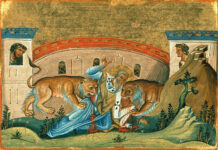People like to know where they are going. They like to have directions, to know when and where they will arrive at the end of a journey. They like being in control of a situation, or at least knowing who is in charge and what the plan is. The funny thing is that, in real life, people almost never know any of these things. Not only that, but when human beings try to control things, those things usually end up more messed up than they were when they started out.
An easy example is Genetically Modified Organisms (GMOs) which are invented with the intention of making life better, easier, more nutritious, etc. Plants, for instance, are genetically modified to be resistant to pests, weed killers (like Round-Up®), freezing temperatures, or drought, thus allowing more food to be produced to prevent famines and such. The flip side is there is evidence that GMOs may have negative impacts on human health. In the years since the genetically modified wheat became common, cases of gluten sensitivity and celiac disease have skyrocketed. Meanwhile, the majority of people in the world still don’t get enough to eat.
Altering one aspect of the world tends to have a massive impact on the rest of creation. In a world where the gut of a termite is full of organisms that make eating wood possible for the termite, nothing is too small to matter. We humans cannot hope to understand all of the ways that everything in the world interacts with everything else. If we cannot hope to understand, then we cannot hope to control any of it. But the fact that no one has ever succeeded does not stop people from trying. Human history is dotted with people who attempted to take over the world and failed.
Last week I was busy stalling watching my brother swimming, I was reading Lois Lowry’s The Willoughbys. This story is about four old-fashioned children who have beastly parents and come to the conclusion that the only way to find happiness is to become orphans, like other old-fashioned children in stories. The children assume that they will be better off if they can control their own lives—if they are in charge of their own destinies. Their attempt to rule their own fate, however, does not end the way they expect, because while they are making their plans, they are also acting, and those actions create ripples that change their lives further. Oddly enough, the way things end up allows them to be much happier than they ever could have been if their original plans had worked out, even though they never, even for a moment, really got to be in charge.
Looking at society right now, it is hard to look beyond the unnerving things that are happening: abortions in ever rising numbers, the redefinition of marriage and family, the careless destruction of the environment, (which displaces and impoverishes people, as well as the helpless animals), the vilification of the Church/pope/Christianity-in-general, the rate at which Catholics are falling away from the Faith. Obviously these are things that ought to concern us. They are terrible. They are regrettable. They are uncomfortable to think about.
Being unable to see where things are going is pretty unsettling. Every so often, I start to be really freaked out by everything going on in the world. I rarely think in terms of gray areas—I stick to black and white—and sometimes the arguments that delve deep into areas that people claim are gray get a bit overwhelming. Those are the times when I have to drag out my all time favorite C. S. Lewis quote: “We are not necessarily doubting that God will do the best for us; we are wondering how painful the best will turn out to be.”
This is the time of year for thinking about uncomfortable things, for remembering that every sin that each one of us has ever committed is, in fact, the “reason for the season.” It is the time to look at all the messed up things that are going on at the moment and laughing, because we know that this—whatever this is—is what is best for us. Somehow all the ripples will end up in exactly the right place and all the evil that God has permitted to be heaped over our heads will reveal the good that they had to bring about. That means we have to weather the bad times too.
After all, two thousand years ago, Jesus was betrayed and sold, then tortured and killed in one of the most horrific manners possible. That’s a pretty painful best for us, and of the crime that started it all we say, “O Happy Fault, O Necessary Sin of Adam,/ which gained for us so great a Redeemer!”
If we can say that the Fall was necessary, that the goodness that came from it is so great as to classify Adam’s sin a happy fault, then surely there can be no doubt that whatever occurs in this day and age, no matter how upsetting or frightening it seems now, can only bring about an opportunity for God to do what is best for us.










